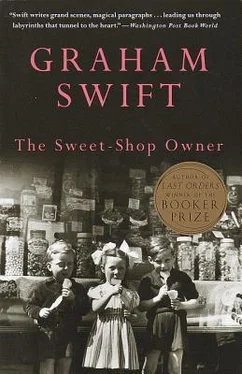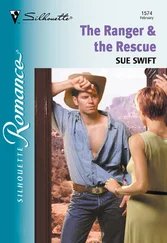Graham Swift - The Sweet-Shop Owner
Здесь есть возможность читать онлайн «Graham Swift - The Sweet-Shop Owner» весь текст электронной книги совершенно бесплатно (целиком полную версию без сокращений). В некоторых случаях можно слушать аудио, скачать через торрент в формате fb2 и присутствует краткое содержание. Год выпуска: 2012, Издательство: Vintage Books USA, Жанр: Современная проза, на английском языке. Описание произведения, (предисловие) а так же отзывы посетителей доступны на портале библиотеки ЛибКат.
- Название:The Sweet-Shop Owner
- Автор:
- Издательство:Vintage Books USA
- Жанр:
- Год:2012
- ISBN:нет данных
- Рейтинг книги:4 / 5. Голосов: 1
-
Избранное:Добавить в избранное
- Отзывы:
-
Ваша оценка:
- 80
- 1
- 2
- 3
- 4
- 5
The Sweet-Shop Owner: краткое содержание, описание и аннотация
Предлагаем к чтению аннотацию, описание, краткое содержание или предисловие (зависит от того, что написал сам автор книги «The Sweet-Shop Owner»). Если вы не нашли необходимую информацию о книге — напишите в комментариях, мы постараемся отыскать её.
The Sweet-Shop Owner — читать онлайн бесплатно полную книгу (весь текст) целиком
Ниже представлен текст книги, разбитый по страницам. Система сохранения места последней прочитанной страницы, позволяет с удобством читать онлайн бесплатно книгу «The Sweet-Shop Owner», без необходимости каждый раз заново искать на чём Вы остановились. Поставьте закладку, и сможете в любой момент перейти на страницу, на которой закончили чтение.
Интервал:
Закладка:
She wore a straw-coloured outfit; heavy, unnecessary make-up, as if to mask her face.
‘Cheerful bunch,’ he’d said, eyeing the children, mouthing the words in the blunt, crass way he’d read the items on the laundry list. Her face didn’t move. ‘Hey, look at that!’ — as a boy swung higher and higher till it seemed he would either fly off or turn full circle. And he’d pulled from his pocket, in a greaseproof bag, four cheese sandwiches which he extended to her in a gesture at once bluff and chivalrous, like a knight laying down arms.
‘Oh — no thanks,’ she said, slightly ruffled — for it was not like her to be lingering in parks, to be watching children on swings, to be speaking with strangers. Yet she was.
They stood in silence, thinking of things to say.
‘You like watching children …?’ Her tone seemed to say: ‘You’re a child yourself.’
‘Yes. Don’t you?’ His cheek was full of cheese sandwich.
She didn’t answer; only looked at the swings with anxiety.
‘I sometimes wish,’ he said, trying hard to empty his mouth, ‘I could join in myself.’
‘But you wouldn’t?’
‘Why not?’
He saw the sudden challenge in her eyes. And was that a smile somewhere in that held-aloft face?
‘Well, if you feel that way …?’
‘It’s Chapman. Willy Chapman.’
‘— why don’t you?’
‘Why don’t I?’
Her head seemed to wobble on her neck.
And he hadn’t hesitated. He gave back her look (did she think he was stupid?). He knew it was a test. He crushed up the grease-proof bag with the remainder of his sandwiches inside and stuffed it in his pocket. He walked to the end of the railings and across the patch of asphalt. Children stared at him. And looking back at her, very straight, defensive, he knew that was how it would be. She would stay, always, behind the railings, watching his readiness, his simplicity, his taking things at face value. She wouldn’t join in. She would watch; he would do. For he did it now, went up and did it, the man from the audience taking the stage. He climbed the steps of the kiddies’ slide, hitched up his jacket and slid down. And as he did so he knew he was hers.
*
Yes, that was pattern. That was not adventuring. She had said, Why don’t you? And he did. And afterwards it was precisely the predictable formula that pleased him: meeting in parks, sitting on benches, his being the humble suitor, buffing his shoes, scrubbing his nails before seeing her, being spruced and set-to by obsequious parents who saw the chance of a fortune.
And there it was — a fortune — duly made over to him by the proper forms and ceremonies, in the corner of a railway compartment, bound for Dorset, while the golden light of a late June afternoon flickered through the gaps in passing roof-tops. And it was saying, ‘Don’t worry. Don’t worry, Willy, about all that nonsense.’
‘They’re always passing judgement, making comment. Jack and Paul especially. Forget them Willy.’
A breeze blew through the open window. There was pink and blue confetti in her hair.
And what she was really saying perhaps was: ‘Don’t talk of Father and Mother, or my brothers. I don’t want to discuss them. Don’t you see? I was the only daughter, I was the odd one of the family. I was a beauty. I had no life. That is why I chose you — with no talent, no initiative — for the justice of it, the symmetry. Don’t think I will change.’
He had put his arm out to her. ‘I’m not thinking of them,’ he said. His voice sounded odd and strident. They were in a first-class compartment with no other passengers. His hand was on one of those smooth, perfect legs. He would have slid it up her pale green skirt. But her face had turned towards the sun-brushed window, her finger-tips were at her necklace.
‘Not now.’
I was the odd one of the family.
Yet her face was exquisite, with its detachment, with its sulky pallor, as she turned back, making him hold his hand as if he were a thief caught in the act of plunder.
Outside, the stations were passing. Woking, Farnborough, Basingstoke. London was left and the munificent house in Sydenham Hill in which they were clearing away the wine glasses, the white napkins, and discussing with satisfaction how the thing had been done. The June sun was sinking over smooth, cooling fields and willowy streams, over reddened, long-shadowed figures caught, nonchalant, by hedgerows and gates, cycling in lanes, grouped at tables outside pubs. The evening air was melting their rigour, their day-time reserve. But she wouldn’t relent, and let those features lower their guard. She only took and squeezed his hand now and then and gave him those short, quick smiles that were like small coins thrown without fuss to someone who has done a service. And she let him lead her, when she prompted, along to the dining-car, where she sat, ordered a light meal, toyed with her fork, and eyed him warily, circumspectly, as though considering an action of the utmost delicacy which could no longer be postponed, and asking herself, ‘What must I do? What must I offer that would suffice? What would be a satisfactory concession in the circumstances?’
Then the sun had sunk, she had put on a little cream scarf and he was carrying cases. And there, suddenly, were the country cottages, and the honeymoon hotel set back from the road, seen already as if in a frame, as if in a photograph in an album opened many years after; the downs of Dorset, pillowy in the dusk, and, beyond, the sea, somewhere murmuring under cliffs. June, 1937. And already landmarks were passing, thick and fast, faster than the passage of the train across the southern counties. Already the church, the bridal dress, and the speeches under the marquee. And she wouldn’t relent.
They unpacked clothes in a room which smelt of polished wood and lavender. What had her mother told her, of the dangers of loitering and the wolves that prowl? But how could he be a wolf? He was a pet dog to be led on a lead; he would run when you called. Oh, she did the right things. She walked with him down a lane where the trees bent like arches and rested her head in the crook of his neck, so that if one needed to demonstrate (if ever it should be a case of demonstrating) one could say, Look, sweeping one’s palm over the scene, there is the picture. But the picture was incomplete.
Later, in their room, with the wooden beams, she undressed deliberately, slowly, as if she were unwrapping a gift, as much as to say: ‘There, see the reward you have got. And do you think such a reward will not ask certain things in return?’ Moonlight, like some theatrical trick, filtered through the lattice windows and lace curtains.
‘Willy,’ she said, stopping him. He was poised and trembling, ready to take his gift. ‘Willy, I’m sorry. I’m not — all I should be. Do you forgive me?’ And what should he have done? Protested, demanded explanations, with her lying blanched in the moonlight? Her face was a mask; sometimes it seemed not to be part of her body. She let him continue, without shrinking, without encouragement, as if it were only done for the form’s sake, as one of the terms of the agreement.
Afterwards he felt he had not touched her, not touched that beauty. He sat up to light a cigarette. Her breasts pointed at him. She pulled the sheet up to her chin. Her face, there on the pillow, hair stuck to her brow, was like a victim’s; and yet it looked at him, for all the world, with triumph, with majesty, and as he bent to her, it smiled quickly and benignly, like a throwing of coins.
Every night their clothes hung over the chair by the bed, stirred by the breeze through the window. And every day the pieces of the picture fell into place: the boat trips to Weymouth, the little scenes of themselves arm in arm on the beach or at tables for two, about which the nodding onlookers might whisper, ‘honeymooners’; their ‘Mr and Mrs’ in the hotel register. But if only she would say, ‘I love you.’ No, not even that, if only she would say — sometimes it seemed she used him like an excuse — ‘I know that you love me.’ But she wouldn’t. Not even when the moment was ripe. When the evening sun burnished the sea and they walked back, in the cool, along the cliff tops. Swallows dived. Cow-parsley frothed in the hollows. Her dress was white with diagonal rows of blue flowers. No, that was not included, not part of the bargain. Wasn’t the rest enough?
Читать дальшеИнтервал:
Закладка:
Похожие книги на «The Sweet-Shop Owner»
Представляем Вашему вниманию похожие книги на «The Sweet-Shop Owner» списком для выбора. Мы отобрали схожую по названию и смыслу литературу в надежде предоставить читателям больше вариантов отыскать новые, интересные, ещё непрочитанные произведения.
Обсуждение, отзывы о книге «The Sweet-Shop Owner» и просто собственные мнения читателей. Оставьте ваши комментарии, напишите, что Вы думаете о произведении, его смысле или главных героях. Укажите что конкретно понравилось, а что нет, и почему Вы так считаете.












